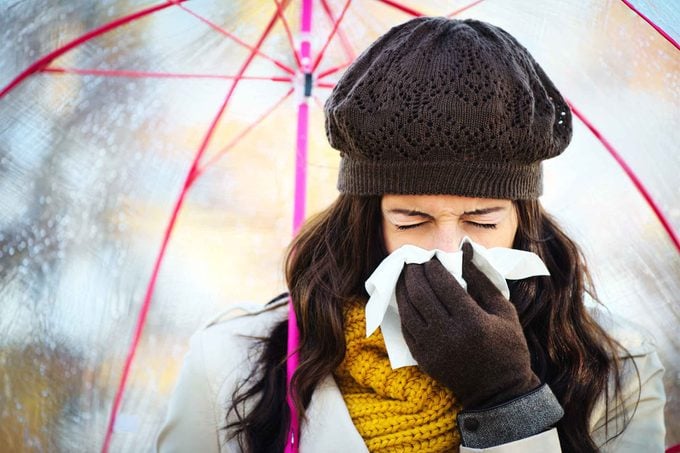Study Suggests You May Be More Likely to Catch Cold in Cold Weather
Updated: Oct. 11, 2022
Science suggests that when it's cold outside your chances of catching a cold may indeed increase.

For years your mom nagged about the importance of bundling up when it is cold outside. She gave you this advice because she felt it would protect you from getting sick. While generally believed to be an old wives’ tale, a 2015 study conducted in mouse cells suggests that you may indeed be more likely to get a cold virus when it’s cold outside. The findings were published in the Proceedings of the National Academy of Sciences.
Researchers found that the cold virus can reproduce more efficiently in the cooler temperature of our nasal passages than they do in the body’s warmer core temperature. This, it seems, could be the real reason people get sick when the temperature takes a dip. Prior to this study, many experts had blamed the higher incidences of colds on the fact that people tend to gather together indoors more frequently when it is chilly outside than they do when it is warm. The theory: that increased contact with others who are sick would lead to an easier exchange of germs. Keep yourself dually protected with one of these winter face masks for Covid-19 protection.
Researchers had long concluded that the rhinovirus—which is the most common virus to cause what is known as the common cold—survived and thrived better in cool noses instead of warm moist lungs. They had kept the focus of prior studies on how body temperature influenced the virus as opposed to the immune system, according to Akiko Iwasaki, PhD, study author and a professor of immunobiology at Yale University.
For this study, the researchers compared immune response to the rhinovirus when cells were incubated at 37 degrees Celsius (98.6 degrees Fahrenheit) versus 33 degrees Celsius (96.8 Fahrenheit). “We found that the innate immune response to the rhinovirus is impaired at the lower body temperature compared to the core body temperature,” Iwasaki said. Translation: Your body may have a harder time fighting off the virus at cooler temperatures.
Though the study looked at mouse cells, its implications can translate and offer clues to how humans handle the virus (since 20 percent of people have it in their nasal passages at any given time). So take your mom’s advice: stay warm, dress in layers, and cover your nose when you go walking in a winter wonderland or check out these 10 strategies doctors use to avoid colds and flu.

